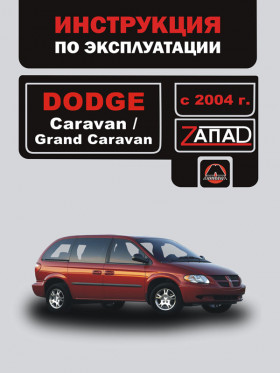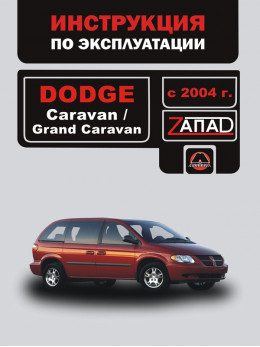Dodge Caravan / Dodge Grand Caravan since 2004, owners e-manual (in Russian)
Only original manuals
Available immediately after payment
Full compliance with the paper edition
100% protection of your payments
Publisher: © "Monolith"
ISBN: 978-966-1672-69-6
Number of pages: 254
Format: file PDF
About the manual
Engine type: gasoline
Displacement: 2.4 / 3.3 / 3.8 L.
In the manual you will find
- Information on self-service car
- Information on the design of the car and how to prevent failure
- The information for the trip to the service station, if the self-repair is impossible
Only original manuals
Available immediately after payment
Full compliance with the paper edition
100% protection of your payments
Publisher: © "Monolith"
ISBN: 978-966-1672-69-6
Number of pages: 254
Format: file PDF
About the manual
Engine type: gasoline
Displacement: 2.4 / 3.3 / 3.8 L.
In the manual you will find
- Information on self-service car
- Information on the design of the car and how to prevent failure
- The information for the trip to the service station, if the self-repair is impossible
Contents
Introduction
- Introduction
- How to use this guide
- Warnings and cautions
- Vehicle identification number
- Vehicle modifications / changes
Necessary knowledge before driving a car
- Information about your keys
- Using alarms
- Side sliding door
- Tilting tailgate
- Windows
- Security
- Engine break-in recommendations
- Security tips
- Exhaust gas
- Checks inside the car
- Periodic checks outside the vehicle
Understanding your vehicle's functions
- Mirrors
- U Connect™ communication system (if equipped)
- Seats
- Opening and closing the hood
- Lighting
- Windshield wipers and washers
- Tilt steering wheel (if equipped)
- Reverse park assist (if equipped)
- Cruise control (if equipped)
- Upper control console (if equipped)
- Overhead lighting
- Glasses compartment
- Compass / temperature monitor
- On-board computer
- Remote garage door opener (if equipped)
- Homelink programming
- Power sunroof (if equipped)
- Power outlet (if equipped)
- Convenient pull-out tray and cup holders
- Luggage compartment
Understanding the dashboard
- Instruments and controls
- Electronic digital clock
- Radio - general information
- Operating instructions - tape recorder
- Operating instructions - CD player
- Commercial Code RB1-AM / FM receiver and DVD\GPS navigation system
- Satellite radio (if equipped)
- Radio control and cell phones
- Climate control
- Rear window functions
Starting the engine and driving
- Engine start procedures
- Block heater (if equipped)
- Automatic transmission
- Brake system
- Power steering
- Traction control switch (if equipped)
- Spare tire information
- Tires - basic information
- Small spare wheel (if equipped)
- Wheel slip
- Tread wear indicators
- Changing wheels
- Fuel requirements
- Vehicle load capacity
- Trailer towing
What to do in emergencies
- Emergency signal
- If the engine overheats
- Jacking up and changing a flat tire
- How to start the engine if the battery is dead
- Driving on a slippery road surface
- Rocking a car stuck in a pit
- Towing a disabled vehicle
Car service
- Engine
- On-Board diagnostic system - OBD II
- Emission control and service programs
- Replacement parts
- Dealer Service
- Caring for your dashboard and cupholders
- Integrated power supply (IPM)
- Replacing incandescent lamps
- Liquids and containers
- Engine
- Chassis
Maintenance schedules
- Maintenance of the emission system
- Maintenance Schedules
Write a review
Your Name:
Your Review:
Customers reviews
Брал машину на рынке Лоск. Заводской эксплуатации в комплекте конечно не было, докупал отдельно. Первое время часто обращался к ней, сейчас реже.






